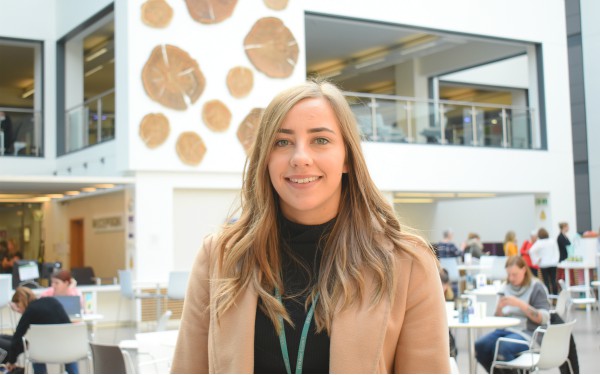“As soon as I joined the team I loved it. It was perfect for me because it had every part of social work in it.”
Social worker Amber Webster is describing her working life in one of Wiltshire Council’s two children and young people’s disabilities (CYPD) teams.
She is not exaggerating when she refers to “every part of social work”: serving a 0-25 age group, the role involves working with children’s and adults’ legislation and across the full range of areas of need – up to and including care -within children’s services.
“What I really like about it is that you are doing different things all the time,” she says. “One day I might be doing a mental capacity assessment, the next a child protection review conference.”
While the broad and deep knowledge base this requires brings significant challenges, the diversity of the teams’ work is anchored in the opportunity social workers have to build consistent, long-term relationships with children and families.
Amber, who joined the team covering the south and west of the county in 2016, says: “In terms of my caseload, 90% I’ve had since I joined the team. I get quite attached to them. Someone who has just left the team had had someone on their caseload for 10 years.”
“I think it’s really important when you are working in disability as there are so many professionals involved to meet the children’s needs, and really overwhelming for families to keep telling their story. It’s really important that we stay with them.”
‘A huge privilege’
The teams’ focus is on working with children and their families to prepare them to lead adult lives that are as independent, integrated, happy and safe as possible – with immeasurable rewards for practitioners in seeing children and young people succeed and thrive.
“They face a lot of challenges and I really enjoy being part of the support for that,” says Amber “Most of the time it’s about seeing the children and families overcome the challenges – it’s really inspiring.”
Service manager Nora Ryan says: “It’s a huge privilege to work with children with a range of disabilities – very rewarding and humbling but can also be challenging.
“It’s a fantastic job with great opportunity for development and a focus on making a difference. When people join the team, they stay.”
Echoing this, Amber, who worked with disabled people before and through her social work training, says: “I’m quite set on the fact that I won’t leave disability.”
Diverse challenges
The range of the social work role on the teams encompasses knowledge of several legislative frameworks – the Children Act 1989, Children and Families Act 2014, Care Act 2014 and Mental Capacity Act 2005 – as well as the full range of children’s procedures, as well as the diverse range of impairments and conditions people have.
Amber’s colleague on the south and west team, social worker Trista Thomas says: “Every child is so different, the disabilities are really different, the services involved are really different – health, education, mental health, OTs. I’m not an expert in everything – you need to have an overview of the particular condition but you also need to have a really good understanding of what that means for these children.”
So how do practitioners keep across such a broad and deep knowledge base?
Amber says: “It’s challenging because you’re master of all trades and it takes more time because it’s not your bread and butter. For example, I’ve just been through court and it’s not very often so we tend to need a bit more support as it’s not something we have to do day in day out.”
She says practitioners work closely with colleagues in children’s and adults’ teams to keep their knowledge up to date and comprehensive.
But, she adds, the challenge is eased by the consistency of practitioners’ relationships with family, as well as manageable caseloads.
Long-term relationships
“With most children’s social work it’s about the child being at risk and you reduce the risk and then the child comes off the plan,” Amber adds. “We work for years with families and develop really close relationships with them and we see the child progress to adulthood. You have the time and resources to really work with people.”
At no point is this more important than at the point of young people’s transition to adulthood.
“It’s really good that the families and children we work with have the consistency of social work,” says Amber. “Transition is still very challenging for families going from making every decision for their children to me saying that they need to have a mental capacity assessment.
“That’s the good thing about a 0-25 service- if they went to an adults’ services team they may not have the full understanding of that family – but we understand the difference [between children’s services and adults’ services] so we can start preparing the families for that.”
Trista gives an example that bears this out: “I am working with one young man now who has just turned 18. We would be considering reducing the number of visit at this stage but he’s really anxious about his transition to supported living, so every two weeks I visit him and he’s able to ask any questions and that’s really helped him to understand and get to grips with the transition. That’s where the 0-25 team is really key because if I didn’t know him it’s possible we wouldn’t have been able to support him in a really positive way.”
“We’ve been going on walks every two weeks. He hasn’t been travel trained but through the walks I can see the potential for him to learn how to walk to the local shop and to be travel trained. It’s really positive to see that. We have to work to establish these routines to enable young people to be as independent as possible. It takes a lot of work but it’s really rewarding.”
So what else helps with transition?
“Knowing your stuff about what resources are available,” says Amber. “For parents, the big change is moving from having all their needs met in school to having community packages. They are more complex and messy but when they work they work really well. That’s quite challenging but knowing what’s out there and what you can do to wrap that support around that person is really helpful. Obviously there’s always a lack of resources but we generally pull it off.”
Trista adds that it is about starting early.
“It’s about planting the seed quite early,” she says. “From 14-15, you look at what the future looks like, getting the family to think about what the future will look like when the young person turns 18 and beyond, providing as much information as possible about what’s going to happen, what assessments, who is going to be contacting whom.”
‘Colleagues are awesome’
What of the teams themselves?
Trista of the south and west team: “They are awesome. Everyone’s really nice, we’ve had a new member join this week and I said to her that it’s the sort of team where you can sit with anyone in a meeting and have a chat. We are one team. There aren’t any cliques.”
She adds: “Tasha, the team manager, is really conscious of what we need to be good social workers. During lockdown I’ve struggled with not going into the office but Tasha has worked really hard to find ways for the team to safely meet, she didn’t have to do that. It’s about the manager knowing the team and knowing that they need to be good social workers.”
Trista is also very positive about being a staff member from a Black Asian and minority ethnic background in Wiltshire.
“I feel very supported,” she says. “There is a BAME staff network and my supervisor discussed it with me and said I would be free to attend events in council time. All staff are welcome to the network meetings, it allows us to celebrate diversity and discuss issues that affect Black and ethnic minority people and it’s been championed from the director of people down to the person who organises it.”
Are you interested in working with children and young people with disabilities, or other roles, in Wiltshire? See the latest vacancies here.




 Facebook
Facebook X
X LinkedIn
LinkedIn Instagram
Instagram